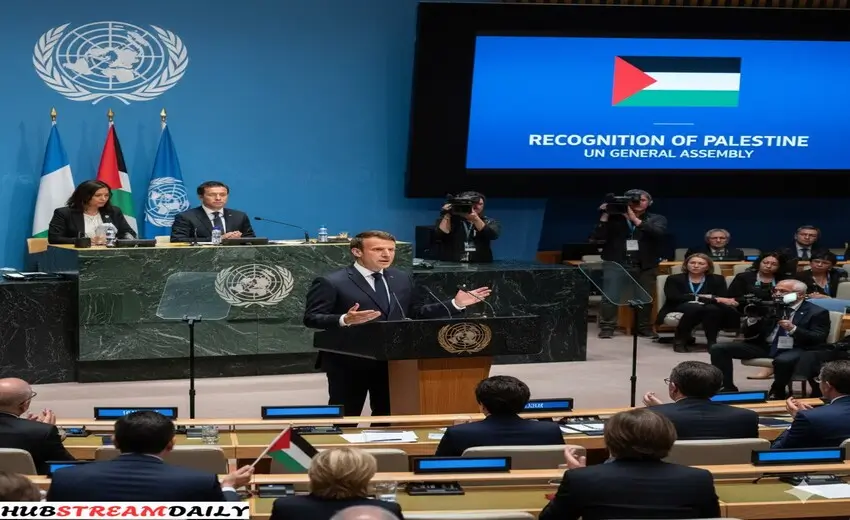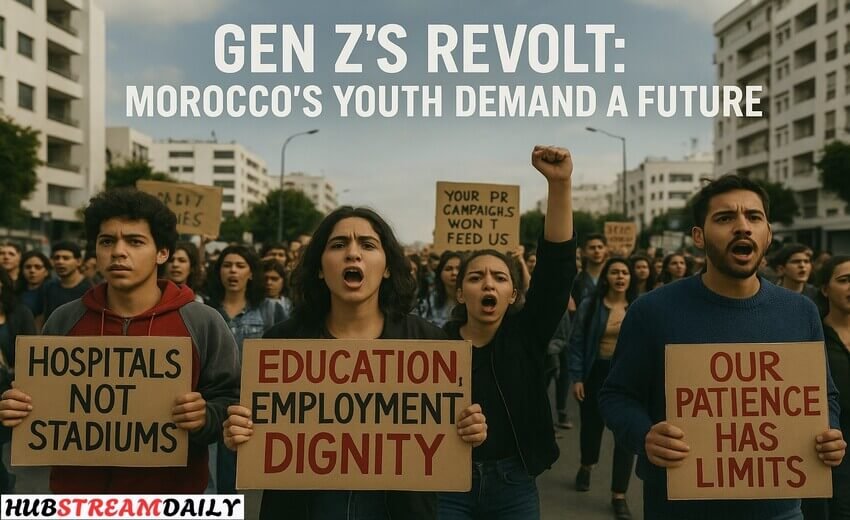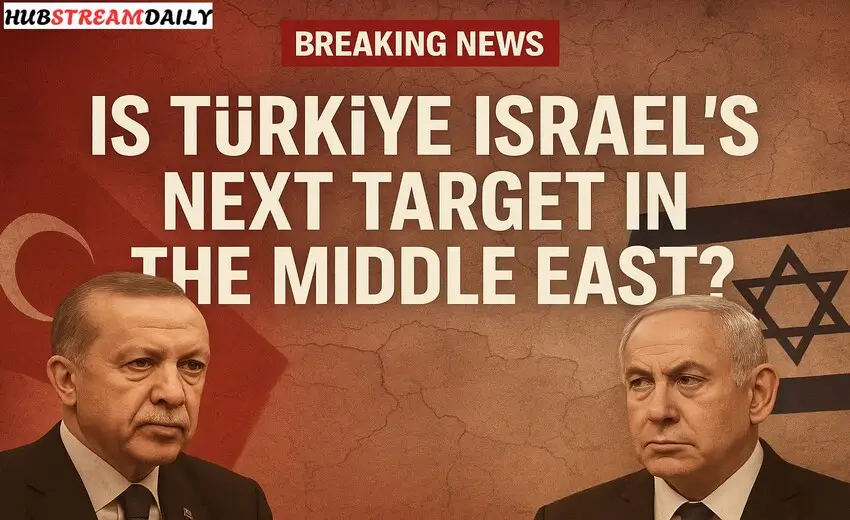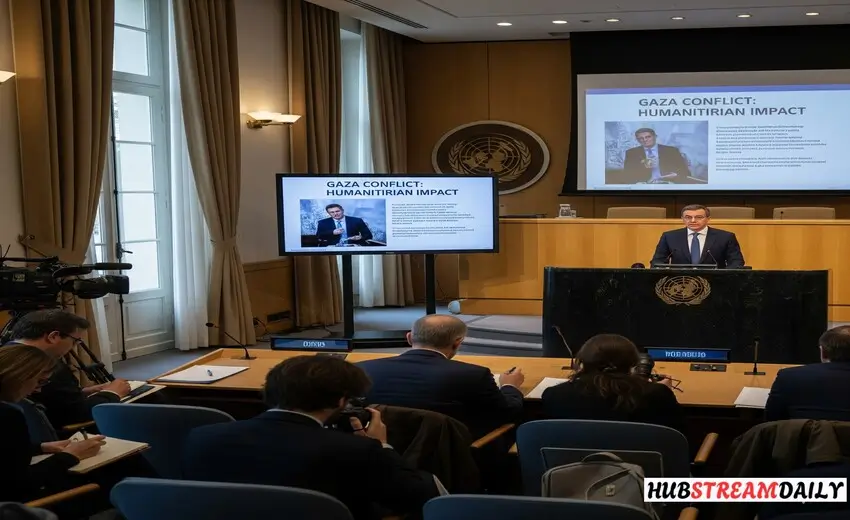
The United Nations General Assembly (UNGA) is about to hold a very tense session, and in anticipation, France has come out in the open to say that it is already working on taking a formal protest to the UNGA in support of the State of Palestine. With this important step, Paris not only shows its intention to withdraw from its policy in the Middle East but also to destabilize worldwide diplomatic relations on the Israeli–Palestinian conflict.
A Diplomatic Turning Point
French President Emmanuel Macron gave an indication this year that Paris was considering changing its position regarding the question of Palestine. It appears that after a long internal debate and consultations with round members of the United Nations, France is inclined to officially declare its recognition in New York prior to the opening of the UNGA.
This move comes at a moment when the international community is lashing out at Israel for its aggressive tactics in the Gaza Strip, and the West Bank settlement’s building continues. By aligning herself with these countries, including Spain, Ireland, Norway, and Sweden, France is saying that the two-state solution is still very much alive while at the same time, stressing that the recognition of Palestine is more than just a symbolic gesture but a requirement for diplomacy.
Growing Momentum for Recognition
More than 140 out of 193 member states of the United Nations (UN) recognize Palestine as an independent state. Nevertheless, in almost all instances in the West, powers, such as the United States, the United Kingdom, Germany, and prior to now, France, had refrained from doing so, citing the need for a negotiated peace settlement.
The decision by the French side is most likely to provoke further arguments across the European Union capitals where the issue of recognition is still deeply divisive. Some, especially those in the East, are still on the side of the Israelis, while others contend that the acknowledgment of Palestine by the EU is an important step towards a peaceful settlement of the conflict.
International Reactions
Israel has reacted decisively by criticizing the announcement extremely harshly. The Israeli side insists that any acknowledgment of Palestine without first having a direct dialogue disrupts the process of settling the conflict peacefully. They went as far as to say that these measures are “terrorism” of the likes of Hamas which gets facilitated by such recognition and simultaneously, the security of Israel lowers.
At the same time, Palestinian leaders consider the French decision as a step in the right direction to rectify a historical injustice. The Palestinian Authority in Ramallah sees this recognition by France as a “hugely encouraging signal of solidarity” towards the millions of Palestinians who have been living under occupation for so many years.
The decision of the Biden administration remains a cautious one as it is, in Washington, they are repeating their consistent view that statehood for Palestine is to be negotiated through talks and not by any side taking it unilaterally. Still, experts say that the expanding number of countries that recognize Palestine might effect such a change in the US policy that it would be forced to rethink its point of view.
Strategic Implications
France’s recognition is not a statement of values alone—it also has significant geopolitical impact. With the help of its UN Security Council membership, France’s course may be perceived as a call to deepen the commitment to the establishment of a Palestinian state by a binding resolution, and that is something the US has always been against by vetoing.
Besides, this declaration comes at a time when the alliances in the Middle East are in the process of changing. The conflict in Gaza is the reason why Israel has lost the support of most of the Global South. On the contrary, several Arab countries that have signed the Abraham Accords and thus already normalized their relations with Israel are now dealing with the public’s reaction at home. France’s move to be more openly on the side of Palestine is an indication that it plans to be more involved in the region’s diplomatic affairs.
Impact on the UN General Assembly
The upcoming UNGA session is expected to be dominated by discussions on Gaza, humanitarian aid, and the future of the two-state solution. France’s recognition could galvanize other hesitant countries to follow suit, potentially making Palestine’s push for full UN membership stronger than ever.
If Palestine secures broader recognition at this session, it could lead to increased pressure on Israel to re-engage in peace talks, though the path remains uncertain given the deep mistrust between the parties.
France’s Historic Decision
For decades, France has walked a diplomatic tightrope in the Israeli–Palestinian conflict. It has long supported the principle of a two-state solution but stopped short of recognizing Palestine, insisting that statehood should emerge through negotiations. Now, under President Emmanuel Macron’s leadership, Paris appears ready to break with that cautious approach.
French officials, speaking to international media, confirmed that recognition is expected to be announced in the days leading up to the UNGA. Macron has argued that continued hesitation only weakens the prospect of peace. “France believes peace will not be achieved by words alone,” he said during a recent address in Paris. “Recognition is a concrete step toward justice and stability.”
This recognition will not be symbolic—it comes with weight. France is a permanent member of the UN Security Council (UNSC), a key player in the European Union (EU), and historically a mediator in Middle East negotiations. Its stance will reverberate well beyond Europe.
The Global Landscape of Recognition
Palestine declared independence in 1988, and since then, more than 140 of the 193 UN member states have formally recognized it as a sovereign state. Many of these recognitions came from the Global South—Asia, Africa, and Latin America—while Western powers, led by the United States, largely withheld recognition.
In Europe, momentum for recognition has been growing steadily:
- Sweden recognized Palestine in 2014, becoming the first EU member state to do so.
- Spain, Ireland, and Norway announced recognition in 2024, describing it as a moral and strategic imperative.
- Belgium, Luxembourg, and Slovenia have debated the issue, with public opinion strongly in favor of recognition.
France’s move is particularly significant because it has traditionally been a heavyweight in both European and Middle Eastern diplomacy. If Paris joins the recognition bloc, it could inspire other major EU members—like Germany or Italy—to reconsider their positions, even if cautiously.
Why Now?
Several factors explain why France is making this decision now:
- The War in Gaza: Israel’s ongoing military operations have triggered international outrage. Civilian casualties, displacement, and humanitarian crises have fueled demands for stronger global action. France’s recognition can be seen as both a response to these developments and a call for accountability.
- Shifting European Politics: Younger generations across Europe increasingly sympathize with the Palestinian cause, viewing it as a fight for human rights and justice. Political leaders in Paris are under pressure to reflect this sentiment.
- France’s Global Role: With the United States maintaining its pro-Israel stance, France sees an opportunity to position itself as a mediator and humanitarian voice in global affairs. Macron has been keen to frame France as an independent actor in international diplomacy.
International Reactions
The decision has already stirred strong reactions across the globe.
- Israel: Israeli leaders sharply criticized the move, describing it as “dangerous and misguided.” Prime Minister Benjamin Netanyahu warned that recognition would embolden “terrorist groups” and undermine peace negotiations. Israel’s Foreign Ministry summoned the French ambassador for urgent consultations.
- Palestine: Palestinian Authority President Mahmoud Abbas welcomed the decision, calling it “a historic act of courage.” Hamas also issued a statement praising France’s recognition, though Israel argues that such approval proves the decision undermines peace.
- United States: Washington has maintained its long-standing position: recognition should only come after negotiations between Israel and the Palestinians. U.S. officials expressed concern that France’s move could complicate the peace process.
- Arab World: Leaders across the Arab League applauded France, urging other Western powers to follow. Jordan’s King Abdullah II hailed it as “a vital step toward realizing Palestinian rights.”
- European Union: Reactions remain divided. While southern and western European nations are increasingly supportive, eastern members such as Hungary and Czechia remain firmly opposed, aligning closely with Israel.
France’s Geopolitical Calculations
France’s recognition of Palestine is not only moral—it is strategic. Paris is aware that the Middle East is undergoing rapid shifts:
- Regional Realignments: The Abraham Accords saw several Arab states normalize ties with Israel, but the war in Gaza has strained those agreements. Recognition of Palestine helps France align itself with Arab public opinion while strengthening diplomatic relations with Gulf powers.
- Security Concerns: France has faced domestic tensions related to the conflict, including large pro-Palestine demonstrations in Paris. Recognition may also serve to calm domestic political pressures.
- UN Security Council Influence: As a permanent member of the UNSC, France’s move adds weight to future resolutions. While the United States may continue to veto Palestinian membership, Paris’s decision ensures the issue cannot be sidelined.
Historical Context: France and the Middle East
France has long maintained a unique role in the Middle East. It was one of the first European powers to advocate for Palestinian rights in the 1960s and 1970s, and it played a central role in pushing the EU toward its 1980 Venice Declaration, which recognized the Palestinians’ right to self-determination.
Over the decades, however, France has balanced support for Israel’s security with sympathy for Palestinian aspirations. This balancing act often frustrated both sides but allowed France to retain credibility as a mediator.
By recognizing Palestine now, France is breaking with its cautious past and embracing a more assertive stance.
Expert Views
International analysts are divided on the potential impact of France’s decision:
- Supportive Analysts: They argue that recognition is overdue and will strengthen diplomatic pressure on Israel to halt settlement expansion and return to negotiations. They see France as a potential catalyst for broader Western support.
- Critical Analysts: Others warn that recognition without a peace process risks deepening divisions. “It is a powerful signal, but signals alone cannot create peace,” one Middle East scholar said.
Implications for the UN General Assembly
The upcoming UNGA session will be closely watched. France’s recognition of Palestine is expected to dominate discussions, alongside humanitarian aid for Gaza and calls for a ceasefire.
Some diplomats believe Palestine could leverage the momentum to push again for full UN membership. While the U.S. would likely veto such a resolution at the Security Council, the symbolic weight of growing recognition could strengthen Palestine’s position on the world stage.
What’s Next?
France’s recognition could trigger several developments:
- EU Shift: Other EU members may follow, creating a stronger European bloc in favor of Palestinian statehood.
- Global Pressure on Israel: Broader recognition could isolate Israel diplomatically, pressuring it to negotiate.
- American Response: While the U.S. is unlikely to change its position soon, growing global consensus may force Washington to rethink its approach in the long term.
- Domestic French Politics: Macron could face both praise and backlash at home, where the Israel-Palestine conflict has already sparked heated debate.
A Step Toward Peace, or More Division?
France insists that recognition is meant to advance peace. “Recognition does not replace negotiations—it creates the conditions for them,” Macron emphasized. Yet critics fear Israel may respond by hardening its stance, halting any prospect of dialogue.
Ultimately, the move highlights a broader truth: the two-state solution remains the most widely supported yet most elusive path to peace. France’s recognition may revive momentum, but without cooperation from both Israelis and Palestinians, peace will remain fragile.
Al last, France’s decision to recognize Palestine ahead of the UN General Assembly is a defining moment in modern diplomacy. It signals not only solidarity with the Palestinian people but also a challenge to the status quo of global politics.
Whether it paves the way for peace or deepens divisions, one thing is clear: France has taken a bold step, and the world will be watching closely.




